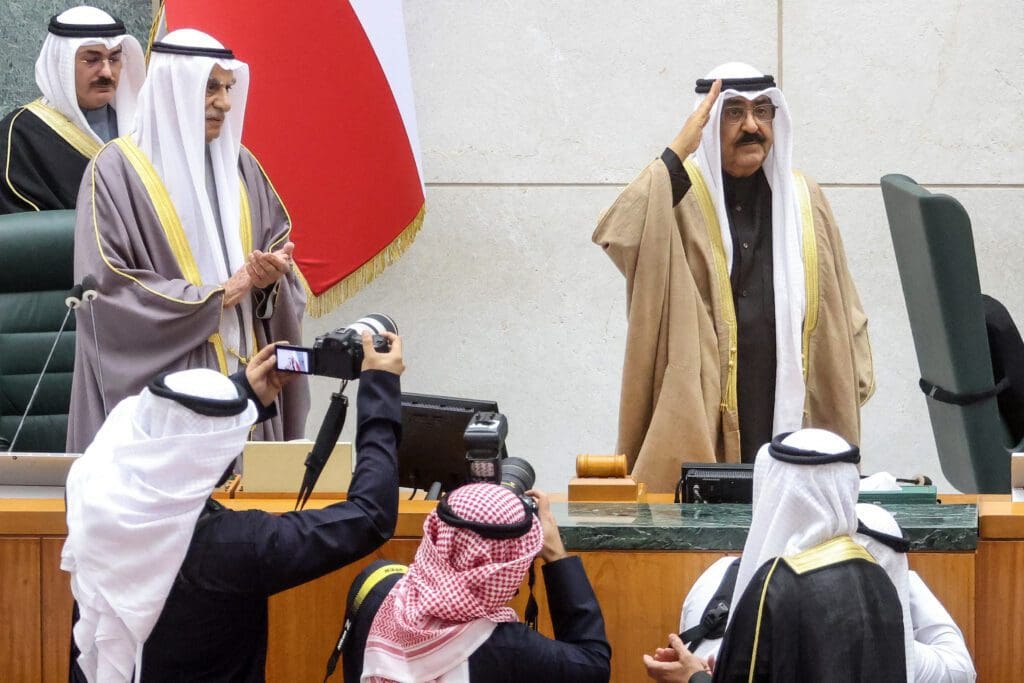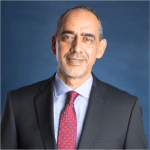There is rumored to have once been a sign in Doha that read, “yesterday Kuwait, today Dubai; tomorrow Qatar.” Although perhaps apocryphal, it captures an important and painful truth for many Kuwaitis. Kuwait initially led the way in the Arabian Gulf and was the first country with its own currency and Constitution of the State of Kuwait. Its relatively free press and empowered parliament stand in stark contrast within a region where democratic norms and practices have lagged behind the rest of the world.
But momentum and dynamism long-ago shifted elsewhere within the Gulf Cooperation Council (GCC). Qatar recently entertained the globe with the FIFA World Cup 2022. Dubai hosted 85,000 participants for the COP28 UN Climate Change Conference late last year. Saudi Arabia is rapidly transforming economically and socially under its ambitious crown prince. In Kuwait, discussions within parliament and the broader public have recently centered upon whether the government should provide personal debt relief to Kuwaiti citizens—an unnecessary handout rife with moral hazard. Rates of gross fixed capital formation are in the bottom half of the GCC, well behind other leading countries in the region. Secondary school graduation rates for Kuwaiti males are now nearly 20 percent lower than the rates for Kuwaiti females. And the government and parliament are often at loggerheads, with the country witnessing seven cabinet reshuffles in less than three years.
The new Emir of Kuwait announces a new era of reforms.
Yet change may be afoot. Kuwait’s new emir, Sheikh Meshal al-Ahmad al-Sabah, announced in his first speech to parliament an era of reform and stressed the importance of government oversight and accountability of the Kuwaiti government. His new prime minister, Sheikh Mohammed Sabah al-Salem al-Sabah, was appointed two weeks ago and could not have been better chosen to lead this transformation. A Harvard-educated Ph.D. economist with extensive diplomatic and administrative experience, the new prime minister has a reputation for being bright, serious, and clean.
The economic and public sector reform agenda for Kuwait has been clear for some time, but progress has been slow and patchy. Vision 2035 articulates a set of well-chosen priorities on the path to becoming a financial and trading hub, focusing upon effective public administration, human capital, a diversified economy, strong infrastructure, high quality healthcare, environmental sustainability, and increasing Kuwait’s global presence. Yet the new government faces a host of challenges that may compromise its ability to make good on the promises of Vision 2035, including resurgent populism, a fractious parliament, and the very real risk that the state’s finances will slip into structural deficit.
What should be Sheikh Mohammed Al-Sabah’s first priorities?
Perhaps the most important would involve putting Kuwait’s financial center in order, as without adequate funding none of the ambitious plans in Vision 2035 will come to fruition. Government finances are currently facing a slow-burning yet existential challenge. Roughly 75 percent of government revenues depend upon oil prices, which can fluctuate significantly in a volatile marketplace and may come under long-term threat as the world transitions to greener energy sources. Government expenditures, on the other hand, are marching relentlessly higher as part of a long-term trend. This upwards trajectory will be further accelerated by a demographic bulge among young Kuwaitis over the next 10-15 years, many of whom will be seeking jobs within the public sector where an astounding 84 percent of Kuwaitis currently work.
To counteract these trends, progress will be necessary along several dimensions where reforms have long been delayed or avoided altogether. The country has not kept pace with its neighbors’ tax reforms. Kuwait’s parliament originally scheduled implementation of a 5 percent VAT for 2021, but it was postponed to 2023 and then delayed further. The IMF has encouraged the government to introduce excise duties, expand the corporate tax to include domestic firms, and implement a local value-based property tax, which would enable a more diversified and stable base of revenues. The passage of a debt law, which expired in 2017 and has not been renewed, would provide the government with valuable flexibility in managing its finances. (Kuwait currently has one of the lowest debt to GDP ratios in the world.)
It is essential that Kuwait restrain the growth of its wage bill, which as a share of GDP is already the highest in the GCC and among the largest in the world. In 2022, the wage bill made up 43 percent of public expenditure and 17 percent of GDP. Since 2005, public salaries have grown by 4.3 times in nominal terms compared with a 1.5-fold increase in government revenues. While public employment provides the government with a ready means of redistributing oil wealth, it also leads to significantly distorted labor markets, undermining productivity and disincentivizing private employment among nationals. The creation of an independent salaries commission to make annual adjustments to civil service salaries and wages would help to reduce expensive ad-hoc increases. Subsidies for energy, water, and electricity, currently among the world’s largest, will also need to be curtailed.
Capital Expenditure in Infrastructure
Once Kuwait’s finances have been stabilized, the next priority will be bolstering capital spending. The bulk of Kuwait’s infrastructure was created in the 1970s and 1980s and may be approaching the end of its service lifespan. Vision 2035 contains a strong pipeline of infrastructure projects, by some estimates totaling $27.6 billion, yet in 2022 the value of projects awarded fell to nearly half of the earlier five-year average. Since the passage of its new procurement legislation in 2016, Kuwait has made some progress in overhauling capital budgeting procedures and procurement regulations to accelerate infrastructure spending, but the agenda remains very much a work in progress. A high-level push to accelerate these efforts would help to unblock bottlenecks and streamline regulatory processes.
How can Kuwait enhance transparency, accountability, and anti-corruption?
Finally, given the new prime minister’s reputation for integrity, it will be important to move forward in strengthening transparency, accountability and anti-corruption, as the emir stressed in his first speech. In 2020, Kuwait became one of seven MENA countries to adopt right to information legislation, although a leading NGO has characterized this legislation as “very weak.” Kuwait ranks seventh regionally on Transparency International’s Corruption Perceptions Index for 2022, behind all other GCC countries and Jordan. In 2016, Kuwait established a new Anti-Corruption Authority, and unlike many such agencies elsewhere, it is generously staffed and funded. Yet its full potential remains to be realized. The authority’s first five-year strategy (2019-2024) will expire this year, and its performance to date should be carefully benchmarked and evaluated in the context of preparing a new one.
This is a rich agenda, but a timely one. With the blessing of the emir, and under Sheikh Mohammed Al-Sabah’s able leadership, Kuwait is facing a unique opportunity to make progress on some of the issues that have perennially hindered earlier reform efforts and exacerbated tensions between government and parliament. It is time for momentum and confidence to return to this state in the northern Gulf.



